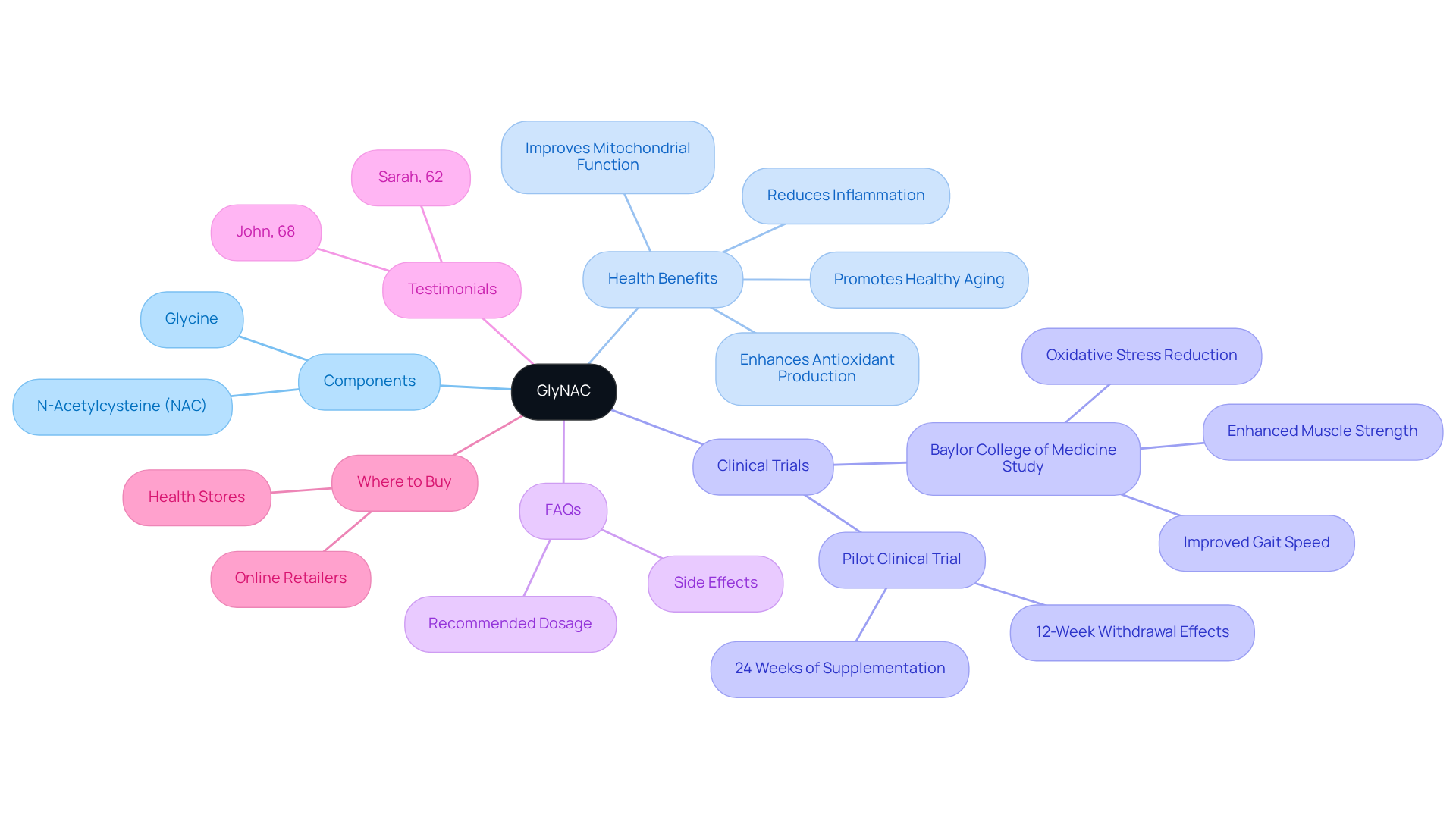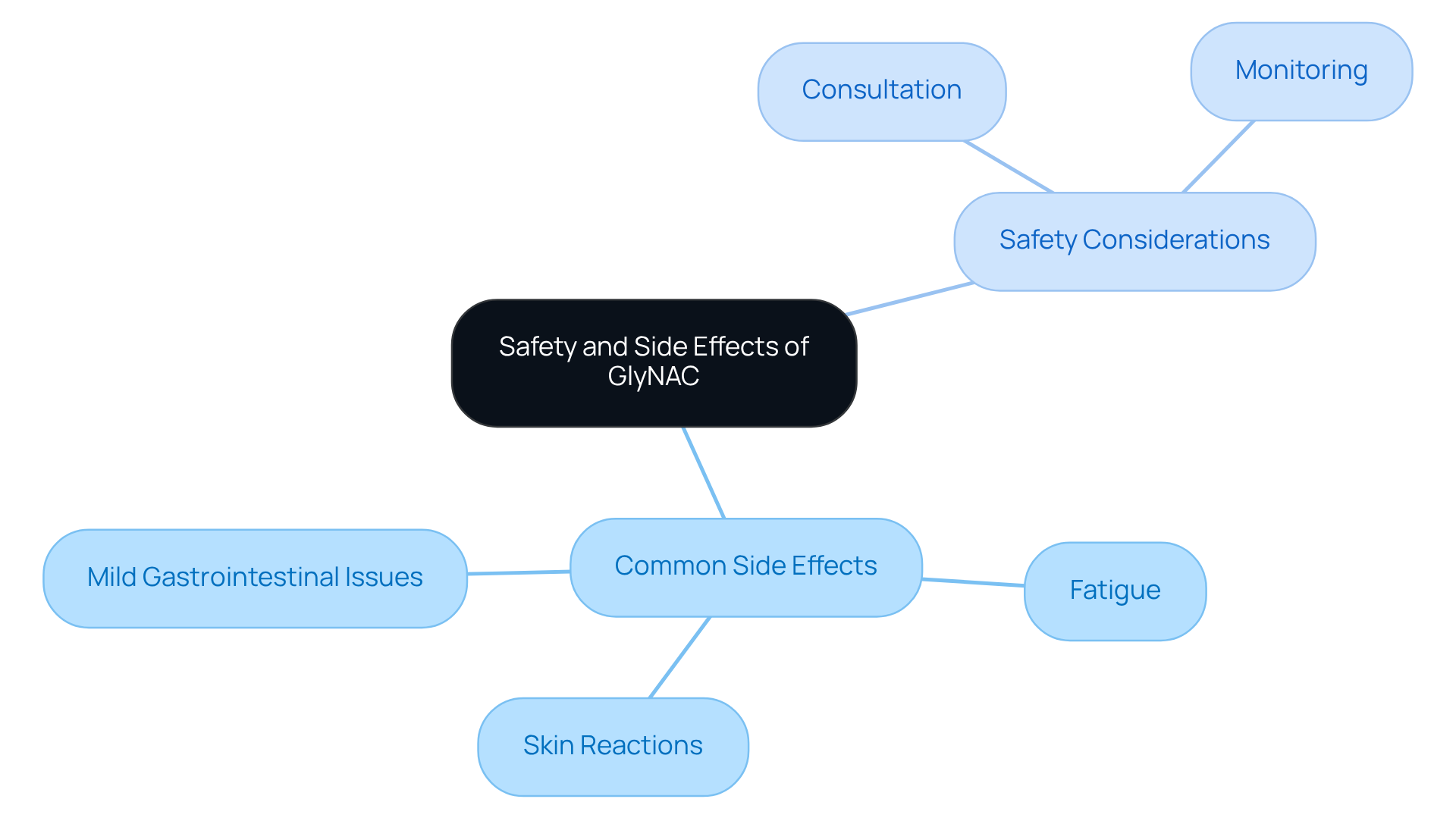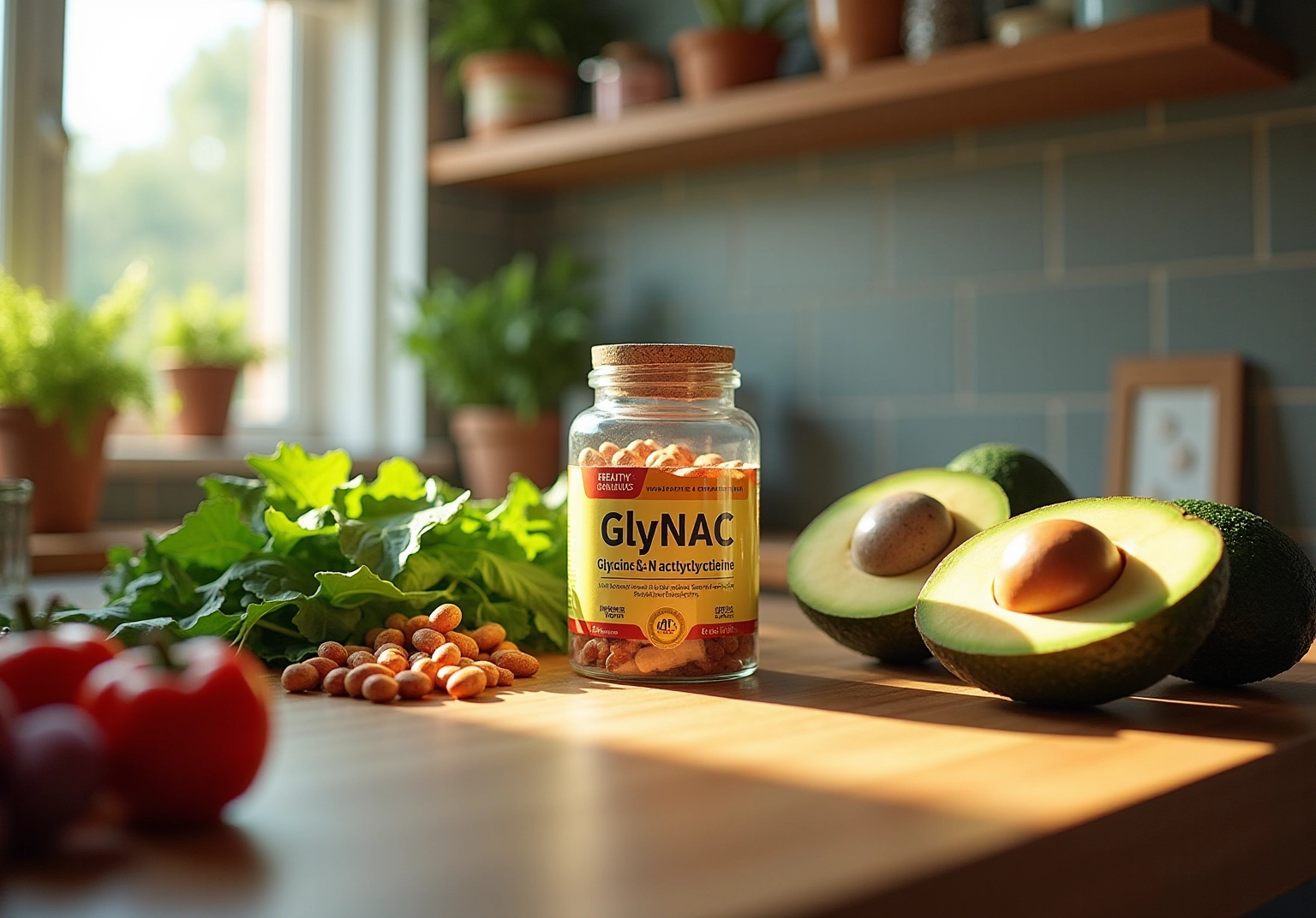Master Your GlyNAC Dosage: Steps for Optimal Health
Overview
This article examines how to determine the optimal GlyNAC dosage for health benefits. It emphasizes the significance of personalized supplementation, which should consider factors such as:
- Body weight
- Age
- Medical conditions
- Activity level
To support this, a step-by-step calculation method for dosage is provided. Furthermore, it highlights the necessity of consulting healthcare professionals to ensure safety and effectiveness, particularly for individuals with specific health concerns. By understanding these factors, readers can make informed decisions about their GlyNAC supplementation.
Introduction
The pursuit of optimal health often drives individuals to investigate innovative supplements that claim transformative benefits. Among these, GlyNAC—a potent blend of glycine and N-acetylcysteine—has emerged as a leading contender in the fields of anti-aging and wellness. This article explores the essential steps for mastering GlyNAC dosage, emphasizing how personalized intake can boost antioxidant production, enhance mitochondrial function, and ultimately support a healthier, more vibrant life.
However, with various factors such as age, body weight, and activity level influencing the ideal dosage, how can one effectively navigate the complexities of supplementation to achieve the best results?
Understand GlyNAC: Components and Health Benefits
The synergistic blend of glycine, an amino acid, and N-acetylcysteine (NAC), a precursor to the antioxidant glutathione, forms a specific compound known for its health benefits. This combination has been shown to enhance cellular well-being by increasing glutathione levels, which is crucial for combating oxidative stress and promoting longevity. Research indicates that supplementation with this compound can reverse age-related abnormalities, improve mitochondrial function, and enhance overall physical performance. Furthermore, it may aid metabolic function and reduce inflammation, making it a valuable component of any anti-aging strategy.
Key Benefits of GlyNAC:
- Enhances Antioxidant Production: Increases glutathione levels, reducing oxidative stress.
- Improves Mitochondrial Function: Supports energy production at the cellular level.
- Promotes Healthy Aging: May reverse age-related declines in physical function and metabolic health.
- Reduces Inflammation: Helps mitigate chronic inflammation associated with aging.
In clinical trials, participants receiving the compound exhibited significant improvements in oxidative stress markers and mitochondrial function, underlining its potential as a transformative approach to healthy aging. Importantly, a clinical trial at Baylor College of Medicine found that the intake of this compound resulted in notable enhancements in walking speed among older adults, highlighting its impact on physical performance. As the elderly population is projected to exceed 2 billion by 2050, the relevance of this compound in addressing age-related wellness concerns becomes increasingly critical. Experts like Yue Liu emphasize that this supplementation could significantly improve health in older adults, warranting further investigation into its long-term benefits.
Frequently Asked Questions (FAQs)
Q: What is the recommended dosage for GlyNAC?
A: The recommended dosage can vary, but it is generally advised to consult with a healthcare professional for personalized guidance.
Q: Are there any side effects linked to this compound?
A: While GlyNAC is considered safe for most individuals, some may experience mild gastrointestinal discomfort. It’s best to discuss any concerns with a healthcare provider.
Testimonials
“After starting GlyNAC, I’ve noticed a significant boost in my energy levels and overall well-being. It’s been a game-changer for my anti-aging regimen!” – Sarah, 62
“GlyNAC has helped me improve my physical performance and recovery time after workouts. I feel more youthful and active!” – John, 68
Where to Buy
GlyNAC supplements are available at various health stores and online retailers. Be sure to choose a reputable brand to ensure quality and efficacy.

Identify Factors Influencing GlyNAC Dosage
Several factors significantly influence the optimal glynac dosage, which is crucial for maximizing its health benefits and aligning with ByKomi’s mission of empowering healthy aging through nutrition.
-
Body Weight: Dosage is typically calculated based on body weight, expressed in mg/kg. Research indicates that a common recommendation for glynac dosage is approximately 100-133 mg of glycine and N-acetylcysteine (NAC) per kg of body weight. For example, for an individual weighing 70 kg, the suggested amount could vary from 7000 mg to 9310 mg each day, based on personal health objectives and circumstances. This tailored approach supports ByKomi’s commitment to personalized nutrition strategies, such as glynac dosage.
-
Age: Older individuals may need modified amounts due to metabolic changes and differences in nutrient absorption. Research indicates that Glycine and N-acetylcysteine supplementation can enhance mitochondrial function and cognitive skills in elderly groups. This emphasizes the requirement for customized amounts that align with ByKomi’s emphasis on anti-aging remedies.
-
Condition Status: Individuals with certain medical issues, like type II diabetes or cognitive decline, may require adjusted amounts to attain optimal effects. GlyNAC has demonstrated potential in combating oxidative stress and enhancing insulin sensitivity. Thus, it is crucial to take into account well-being when deciding on the glynac dosage. This corresponds with ByKomi’s objective of improving wellness results through innovative therapies.
-
Activity Level: Those who engage in higher levels of physical activity may benefit from increased dosages to support recovery and energy levels. Active individuals frequently need additional nutrients to sustain performance and overall well-being, as greater physical activity is linked to heightened nutrient requirements. This further highlights the significance of tailored support.
Comprehending these factors can assist individuals in making knowledgeable choices regarding their supplementation. This ensures they attain the desired health results while adopting ByKomi’s philosophy of healthy aging through nutrition.

Calculate Your Optimal GlyNAC Dosage
To calculate your optimal GlyNAC dosage, follow these steps:
Step-by-Step Calculation:
- Determine Your Body Weight: Weigh yourself in kilograms (kg).
- Select Your Glynac Dosage: Research indicates a common glynac dosage of 100 mg/kg/day for glycine and 133 mg/kg/day for N-acetylcysteine (NAC). GlyNAC supplementation has been associated with various wellness benefits, including potential anti-aging effects, making it a valuable addition to your routine for well-being.
- Perform the Calculation:
- For example, if you weigh 70 kg:
- Low end: 70 kg x 100 mg/kg = 7000 mg
- High end: 70 kg x 133 mg/kg = 9310 mg
- For example, if you weigh 70 kg:
- Adjust for individual factors by considering your age, medical condition, and activity level to fine-tune your glynac dosage within this range. Older individuals, for example, may need modifications due to age-related shifts in metabolism and well-being. As pointed out by Dr. Rajagopal Sekhar, this supplementation has demonstrated potential effects for enhanced survival rates in older patients.
- Consult a Medical Expert: Before beginning any new supplement routine, it’s recommended to consult with a medical practitioner to ensure safety and effectiveness, particularly if you have pre-existing medical issues or are taking other medications. ByKomi provides a variety of products formulated to support your health journey, ensuring you have access to quality supplements that align with your wellness goals.

Recognize Safety and Side Effects of GlyNAC
While GlyNAC is generally regarded as safe for most individuals, it is crucial to be aware of potential side effects and safety considerations.
Common Side Effects:
- Mild Gastrointestinal Issues: Some users may experience nausea, diarrhea, or stomach upset.
- Fatigue: A small number of individuals report feeling tired after beginning the intake of the supplement.
- Skin Reactions: Rarely, skin rashes or irritation may occur.
Safety Considerations:
- Consultation: It is essential to consult with a healthcare professional before initiating GlyNAC, particularly if you have pre-existing health conditions or are taking other medications.
- Monitoring: Regularly track any side effects or changes in health status after starting the supplements. Adjust the GlyNAC dosage as necessary in consultation with a healthcare provider.
Research indicates that Glycine and N-acetylcysteine supplementation is well tolerated, with no severe adverse effects reported during clinical trials. Participants in studies showed no significant elevation in plasma creatinine or liver enzymes, suggesting a favorable safety profile. Furthermore, observation of negative occurrences during trials verified that this compound does not usually result in significant complications.
By understanding the components, calculating the GlyNAC dosage, and recognizing potential side effects, you can effectively incorporate GlyNAC into your health regimen for optimal benefits.

Conclusion
Mastering GlyNAC dosage is essential for maximizing its health benefits and supporting optimal aging. This compound, a blend of glycine and N-acetylcysteine, has demonstrated significant potential in enhancing antioxidant production, improving mitochondrial function, and promoting healthy aging. By understanding the components and their effects, individuals can make informed decisions to effectively incorporate GlyNAC into their health regimen.
Key factors influencing GlyNAC dosage include:
- Body weight
- Age
- Medical conditions
- Activity levels
Personalized dosage calculations are vital to achieving desired health outcomes. Furthermore, awareness of potential side effects and safety considerations ensures that individuals can approach supplementation responsibly, consulting healthcare professionals when necessary.
In summary, the significance of GlyNAC in promoting health and longevity cannot be overstated. As individuals seek to enhance their well-being and combat age-related declines, understanding how to optimize GlyNAC dosage becomes a vital aspect of their health journey. Embracing this knowledge empowers individuals to take proactive steps toward healthier aging, making informed choices that align with their unique health needs and lifestyle.
Frequently Asked Questions
What is GlyNAC and what are its main components?
GlyNAC is a compound formed by the synergistic blend of glycine, an amino acid, and N-acetylcysteine (NAC), a precursor to the antioxidant glutathione.
What health benefits does GlyNAC provide?
GlyNAC enhances antioxidant production by increasing glutathione levels, improves mitochondrial function, promotes healthy aging, and reduces inflammation.
How does GlyNAC impact oxidative stress and mitochondrial function?
Research indicates that GlyNAC supplementation can reverse age-related abnormalities and improve mitochondrial function, leading to significant reductions in oxidative stress markers.
What improvements have been observed in clinical trials involving GlyNAC?
Clinical trials have shown significant improvements in oxidative stress markers, mitochondrial function, and walking speed among older adults who received GlyNAC.
Is there a recommended dosage for GlyNAC?
The recommended dosage can vary, so it is generally advised to consult with a healthcare professional for personalized guidance.
Are there any side effects associated with GlyNAC?
GlyNAC is considered safe for most individuals, but some may experience mild gastrointestinal discomfort. It’s best to discuss any concerns with a healthcare provider.
Where can I purchase GlyNAC supplements?
GlyNAC supplements are available at various health stores and online retailers. It is important to choose a reputable brand to ensure quality and efficacy.






